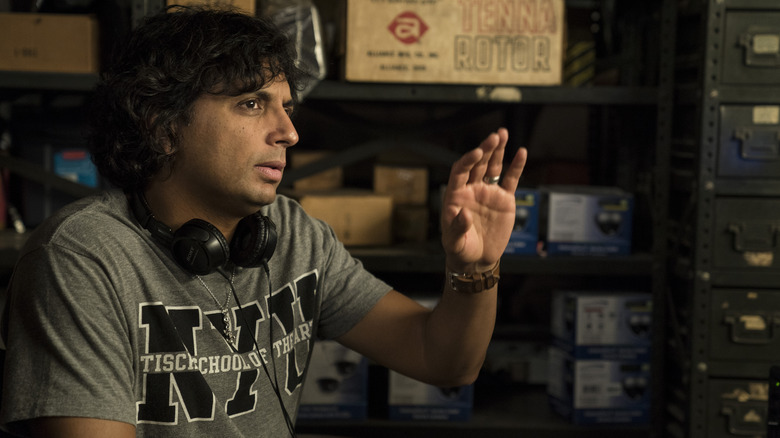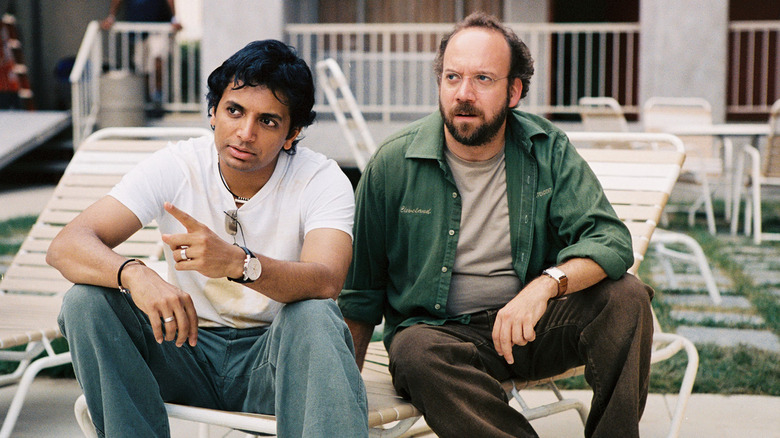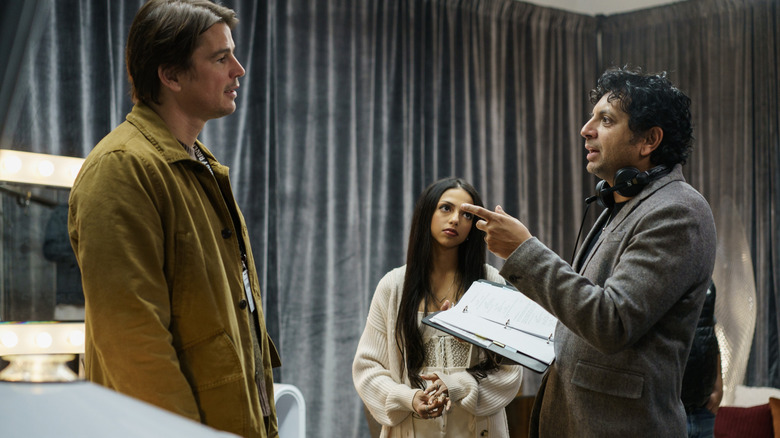M. Night Shyamalan Has A Theory About Why Critics Hate His Movies
We may receive a commission on purchases made from links.
The worst thing that ever happened to M. Night Shyamalan's was the August 5, 2002 cover of Newsweek magazine. The filmmaker was red hot coming off the surprise box office success of "The Sixth Sense" and a solid double of a hit in "Unbreakable," and about to pack theaters once again with his blockbuster sci-fi/horror opus "Signs." He was the toast of Hollywood, seemingly on the cusp of becoming a smash-crafting industry unto himself. It was a lot for one guy to deal with before the then prominent publication got completely carried away and declared the then 32-year-old director "The Next Steven Spielberg." Afterwards? It dogged him like a curse.
Shyamalan didn't handle this particularly well. Leaving aside how you feel about M. Night's movies, he followed up the mild disappointment of "The Village" with the strangely hostile "Lady in the Water," in which the filmmaker plays a supporting character whose writing possesses the power to transform the world. It's a zany movie that likely would've flopped even if he hadn't burdened its theatrical release by giving journalist Michael Bamberger unfettered access to his soul via the making-of book "The Man Who Heard Voices." It felt like Shyamalan had completely bought into that Newsweek headline, and in turn believed himself infallible.
The best that can be said about "The Village," "Lady in the Water," and even the much-ridiculed "The Happening" is that they are personal visions. Disney, Warner Bros., and 20th Century Fox allowed Shyamalan to make these movies on his terms, and he delivered summer entertainments that felt wholly unlike anything else at the multiplexes.
You may very well be a fan of these movies, and that's terrific! I am, to varying degrees, not, but I'm always open to hearing why they're misunderstood masterpieces. I'm not sure I want to hear this from Shyamalan (because he's already made his case with each finished film), but the writer-director is unafraid to speak his mind so let's hear him out.
Were critics simply not hip to the jazz of Shyamalan's most disappointing movies?
In an interview with The Atlantic's David Sims, Shyamalan acknowledged the failure of "hired gun" efforts like "The Last Airbender" (no hyperbole, one of the worst movies I've ever seen) and the Will Smith sci-fi flick "After Earth." If Shyamalan thinks he regained his footing creatively with "The Visit" and "Split," I will happily agree with him. They're two of his best films.
Where I'll part company with Shyamalan in the assessment of his movies is the notion that "The Village" and "Lady in the Water" are "jazz" that's too narratively/thematically different for critics to grasp. This is hogwash. He brought up Russian filmmaker Mikhail Kalatozov to Sims as an aesthetic influence on his films, and I can totally see it in "The Sixth Sense," "Signs," and especially "Unbreakable" (though I thought M. Night's superhero riff, with its long takes and clever camera placement, owed more of a stylistic debt to Andrei Tarkovsky). "The Village" and "Lady in the Water," however, are nowhere near as assured visually as those films (the respective cinematography by Roger Deakins and Christopher Doyle be damned); Shyamalan was losing his fastball on those movies, and seemed to have lost the strike zone entirely with the clumsily directed "The Happening" (though /Film's Chris Evangelista feels it's a B-movie classic).
Aside from the aesthetic disconnect, though, there is something else eating at Shyamalan.
Shyamalan just wants the benefit of the doubt
Shyamalan wraps up his defense of those movies with the following observation:
"I am an immigrant, at the end of the day, and I'm telling stories not about immigrants. Sometimes it feels like it would be easier to swallow if I was making movies about Indian mathematicians or something like that. Then I would get the benefit of the doubt."
I understand his frustration. It must suck to pour your heart and soul into a movie, and fail to connect with the critics as well as a mainstream audience ("The Village" earned a Cinemascore of C, while "Lady in the Water" drew a B-). But I don't think I've ever gone into an M. Night Shyamalan film thinking about his cultural background, just as I don't think about Spielberg's or Martin Scorsese's upbringing unless they address it within the fabric of the movie (as the former did with "The Fabelmans"). I'd like to think this is true of most critics and people in general.
Ultimately, we don't matter — at least, not yet. Shyamalan's movies are bold auteurist undertakings in that he's able to shoot movies on decent-sized budgets that divide audiences. I haven't been wild about all of them, but it is heartening to see that his visual craftsmanship is still superb after rebounding from those "one for them" efforts. My favorite director on the planet is Brian De Palma, and he's every bit as divisive as Shyamalan. Artistically, we need dividers — and if they get to tick off a sizable portion of viewers on a studio budget, even better. There may come a time when those budgets are harder to come by, but Shyamalan, who signed a first-look deal in 2023 with WB, clearly isn't there yet.
Shyamalan is critic-proof. At this point, if we still bother him this much, he should just do what the many of the nation's newspapers have done and cut us out of his life completely.


